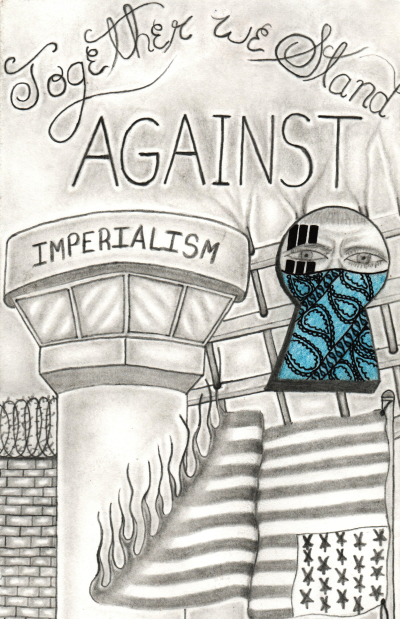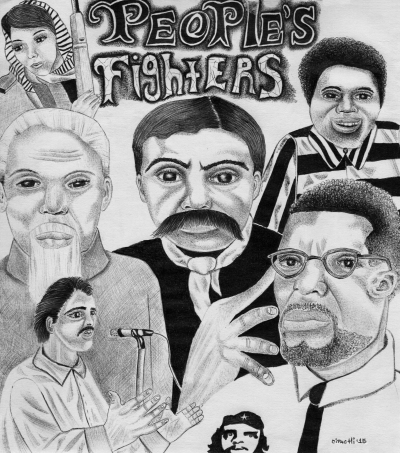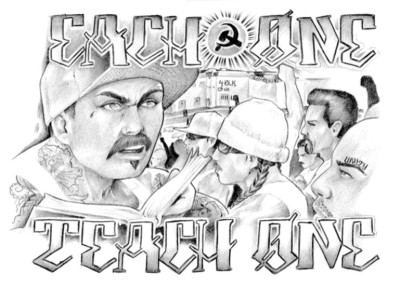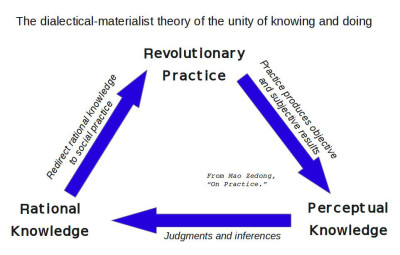
Book Review: Red Scare: Memories of the American Inquisition
Red Scare: Memories of the American Inquisition
By Griffin Fariello
Avon Books, 1995
Red Scare is set in the time when there were open communist witch hunts across Amerika. Younger people may not remember or even have heard of the time when it was a crime to be a revolutionary in the United $tates. Although the laws have made it “legal” today to be a communist, it really isn’t as legal as many think. The state’s old methods have only been fine tuned and made more subtle, but the repression still exists and may even be more dangerous today than in years past.
Senator Joe McCarthy, elected in 1946, started off as any other Senator and then took a real fascist turn in 1950 when he began his anti-communist terror. His political life did not last too long as McCarthy died in 1957 but his ideals lived on and took on even more deadly ways in the years after, especially for oppressed nations in Amerika.
The 1950s was a tougher time for communists in Amerika. There were many laws that were anti-communist in nature. In the state of Texas for instance, membership in the Communist Party would get you twenty years in prison. In the state of Michigan to just write or speak subversive words would get you life in prison! No wonder Michigan today has some of the largest white supremacist militias in Amerika. The state of Tennessee would give you the death penalty for what it called “unlawful advocacy” that was aimed at communists.
This was a time when buying a house came with having to sign a “loyalty oath” denouncing communism. A student receiving a diploma had to first sign an oath, people living in the projects had to sign it for the landlord at rent time. This was the “war on terror” on steroids. Think of the round ups and harassment of Muslims in Amerika post-9/11 and triple that!
By 1956 Hoover’s FBI spread its slimy tentacles so much that in the CP-USA, whose membership at that time was less than 5,000, one out of three members was an FBI informant. This may help explain CP-USA’s passivity on many issues at that time. It was a time when the feds had three informants in a three-persyn CP unit, so entire units were comprised of informants, which also helped to ensure who was supplying reliable information and who wasn’t as the informants were not aware the others were informants.
The information on surveillance and what one ex-FBI agent called “bag jobs” was enlightening. It was a look on how the feds really teach their agents about those of us who want to free the people from oppression. An ex-FBI agent M. Wesley Swearingen is interviewed about his targeting of a communist group in COINTELPRO-like methods, defends his self-described “hundreds” of bag jobs by saying
“none of us worried too much about the illegality, because most of us were veterans from World War II. Gee, all you had to do is wave a flag and we’d stand up and salute and do all kinds of things. And after the indoctrination we got in training school about communism and the communist party and how they were trying to overthrow us, it was like war all over again, just that no one was shooting at anybody yet…”(p. 86)
Like in the 1950s, the FBI enjoys recruiting its agents from police or military. Like Swearingen noted above, all you have to do is “wave a flag and we’d stand up and salute and do all kinds of things.” And so when people want to stop genocide, exploitation and other madness, the state is meanwhile teaching its agents that it’s war, only no one is getting shot yet. It’s war because poor people don’t want to live in land contaminated by toxic waste, because poor people are protesting the corporate greed, the war on the Third World, etc. For objecting to this monstrous behavior it’s like “a war all over again.”
The “bag job” involved breaking into a home of a suspect, and if the suspect was a communist or member of the CP the agents would search for any pieces of paper with anyone’s names. It could be the paper boy’s name but agents would gather these names and add them to the “security index” which was a list kept by the FBI of those “subversives” (communists) who, in case of “national emergency,” would be rounded up in concentration kamps. This was awfully similar to how in California prisons the state deals with the validation process: during all searches any names found in a supposed gang member’s cell are added to a database as a gang associate for future targeting and possible round up into SHU (concentration kamp). The similarities are uncanny, if you simply substitute “communist party” with “prison gang” you would think a lot of this was written about California’s validation program.
For example, the ex-FBI agent M. Wesley Swearingen goes on to say
“During the Church Committee hearings one of the Senators asked James Adams, who was the associate director of the FBI, how long a person would stay on the security index. I think they were talking about one individual who had been on there something like twenty or twenty-five years. And the senator said ‘Did you have any information that he was still a member of the communist party?’ and Adam’s response was ‘we didn’t have any information that he was not a member of the communist party, then we’d keep him in there and we’d keep him on the security index.’ Sometimes we would get information that someone did drop out of the communist party, but we wouldn’t believe it anyway. Bill Sennett stayed on the security index almost ten years after he quit the party because no one would believe it.”(p. 95)
The chapter titled “Five minutes to midnight” discussed the underground. In the late ’50s CP-USA began discussing the inevitability of war between the Soviet Union and the United States. It was decided that the United States was on the verge of repression and so to survive the coming fascism the party would need an underground organization.
The underground apparatus was organized in three different levels. The first level was called “deep freeze” which were top leadership who jumped bail for conviction on the Smith Act which basically criminalized the act of being a communist, along with those who it was assumed would be in the next sweep of arrests. The second level was called the “deep deep freeze.” These were trusted members who would be a source of leadership should all the other leaders be arrested. Many of these people were sent abroad to Mexico, Canada or Europe, kind of like sleeper cells, to lead normal lives and not engage in any political activity. The third level was called “operative but unavailable” who traveled state to state in disguise working as liaison between the aboveground party and the deep freeze.
According to the author, millions of dollars were spent on the underground apparatus with lodgings, transportation, and the courier system that kept the hundreds of men and wimmin underground. This took its toll with almost everyone abandoning the party within five years. The writer states “seasoned communists realized the impossibility of carrying a political movement in this fashion.” A couple of decades later, activists would probably beg to differ with this because of the targeting, murder, and imprisonment that followed being above ground.
The Smith Act created some real anti-communist ways of thinking. The city of Birmingham, Alabama for instance passed a law in the 1950s mandating that all communists had forty-eight hours to leave town or face imprisonment. This was looked at as normal treatment for political ideas by many. This continues to sound like the witch hunts progressive prisoners face today in Amerika where you are locked in control units, not for acts, but ideas, beliefs or assumed beliefs and yet it’s not for 2 or 3 years like when the Smith Act was enforced but decades and sometimes for life!
Red Scare falls short in not analyzing the politics of this era, not discussing the political line of revolutionary groups of the 1950s. The Jim Crowism was not even really talked about much. The author does discuss events like the Rosenberg trial/execution, children of the persecuted and what ey calls “redactors” who were the teachers who were persecuted under McCarthyism. But ey does not get into the oppressed nations of that time. The author gives one example of the CP-USA going to New Mexico to work in the Chicano barrios, briefly mentions the Black Panthers, and does not even mention the First Nations.
One will not learn anything of the different ideologies of that time yet this book is worth reading if you seek to understand the birth of COINTELPRO which really decimated the oppressed nations’ struggles in the ’60s and ’70s. Although this book was written in the 1990s it reads as if it was written in the 1950s with its oppressor-nation outlook on struggles during the McCarthy period, a little too vanilla and boring, but worth plowing through the 500+ pages only for its content on early COINTELPRO.
Red Scare speaks volumes about the success of the Soviet Union in building socialism, a more popular alternative to capitalism. While it is easy to laugh at the extreme paranoia expressed by the state in this period, there was a real fear starting in the 1930s when the Soviet Union was developing in leaps while the capitalist world crumbled under the great depression. Coming out of World War II, during which the Soviet Union demonstrated its technological and ideological strength, the Red Scare of the 1950s reflected this.












